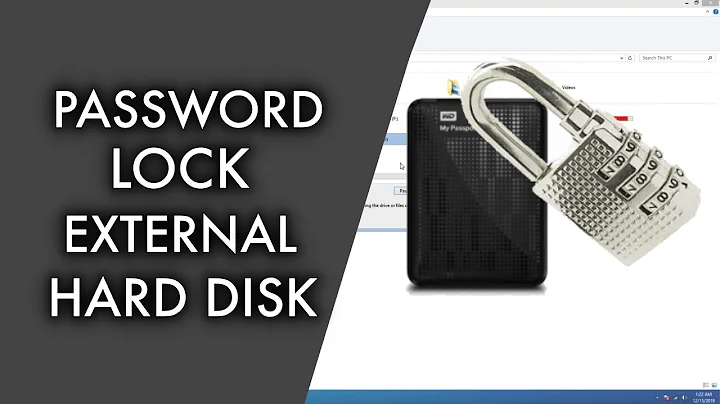Can I recover a password-protected hard drive using an external USB adapter?
BIOS passwords may provide zero security when it comes to stealing a computer, or moving the drive between machines.
Some implementations only prevent the BIOS from booting to the drive if a password does not match. It does not actually lock, encrypt or secure the drive itself.
If you need to remove the password, it is easy:
BIOS passwords are simple locks. If you don't provide the password, the BIOS simply stops and doesn't continue the boot process.
There are two ways to get around this simple lock:
1. Clear the BIOS/CMOS memory (usually requires direct motherboard access). 2. Remove the drive and connect it to another computer (easier).
Edit
Hennes informed me my information might be out of date, so I did some more digging:
It appears there is also the possibility that, depending on drive and system manufacturer that the drive will, in fact become locked from the password due to a special sector on the drive. These can be recovered or deleted sometimes.
tl;dr
It depends.Related videos on Youtube
mcu
Updated on September 18, 2022Comments
-
 mcu almost 2 years
mcu almost 2 yearsI want to set the HDD password (in the BIOS) on my Dell Latitude C840 laptop. But before I do, I have a question. If the laptop was to fail, can I still connect the HDD to a USB hard drive adapter and get my data off it? This question is not about bypassing the password, but if the hard drive adapters are capable of handling passwords.
Thanks.-
ganesh about 11 yearsYou would need to test it, but I suspect the answer is 'No'. You will need the original laptop (or its password stored in the BIOS). Not the password which you enter as HDD unlock password. This is often not the actual password sent to the HDD.
-
 mcu about 11 yearsHmm, I was afraid of something like that. Just to be clear, I am not setting the BIOS password, but rather the BIOS gives me an option to set the
mcu about 11 yearsHmm, I was afraid of something like that. Just to be clear, I am not setting the BIOS password, but rather the BIOS gives me an option to set theHDD password. I believe it is called an ATA password. Why is it that what is sent to HDD is different from what I enter? How does the BIOS change it? Is it some kind of a hashed value? Thanks. -
 mcu about 11 yearsAnd back to my original question, if I know what password is actually set in the HDD, can I use a USB adapter to connect to such a drive? Does the adapter allow me to enter the password?
mcu about 11 yearsAnd back to my original question, if I know what password is actually set in the HDD, can I use a USB adapter to connect to such a drive? Does the adapter allow me to enter the password? -
ganesh about 11 yearsIf it is actually set on the drive and transmitted to the drive in plain text (e.g. not encoded with a hash in the BIOS) then using an USB to SATA adater should be able to unlock the disk. You might need extra software to do that (read: you might not be able to boot from a disk which is thusly protected, but you can plug in into a running system and use ` hdparm --security-unlock PWD` to unlock the drive. Might. Untested!.
-
 Austin T French about 11 yearsSometimes you can, although it may not be easy. See my answer, as it can be BIOS level, saved on the Hard Drive on a special sector, or in the firmware which varies the level of supprot.
Austin T French about 11 yearsSometimes you can, although it may not be easy. See my answer, as it can be BIOS level, saved on the Hard Drive on a special sector, or in the firmware which varies the level of supprot. -
 mcu about 11 yearsSo, it looks like
mcu about 11 yearsSo, it looks likehdparmmight do the job. Now I just need to figure out what is actually set on HDD. How do I know if the password is set on HDD in plain text or not? Or is there a way to know which hash algorithm the BIOS uses to scramble the password? -
 mcu about 11 yearsHere is a thought. Why not just use
mcu about 11 yearsHere is a thought. Why not just usehdparmto set the password, instead of the BIOS option? This way it should be in plain text I would assume. Of course the chances of something going wrong are much greater with this one. And if the BIOS does scramble the password, the BIOS boot up will probably not work. -
Karan about 11 years@coding4fun: After having read everything on this page it occurs to me, why do you want to use a BIOS HDD password anyway? Why not something like BitLocker or TrueCrypt drive encryption instead, that will easily allow you to access the encrypted drive on another PC if required as long as you have the password?
-
 mcu about 11 yearsI have considered that, but I have several partitions, both Windows and Linux, and wanted to lock down the whole thing at once. Although, encryption is more secure.
mcu about 11 yearsI have considered that, but I have several partitions, both Windows and Linux, and wanted to lock down the whole thing at once. Although, encryption is more secure.
-
-
ganesh about 11 yearsThis is not true for all laptops (e.g. not for a Dell lattidute D series. Setting a BIOS/boot password just prevent the laptop from going past post. Also setting a HDD password made the HDD unusable on other computers). This might be shared between lattitude C series and lattutude D series)
-
 Austin T French about 11 years@Hennes you are right, I updated significantly my answer, although its much less of an answer now :D
Austin T French about 11 years@Hennes you are right, I updated significantly my answer, although its much less of an answer now :D -
uxout about 11 years"It depends" is completely correct, unfortunately...implementations vary.
-
 mcu about 11 yearsYeah, it looks like I might be able to use a program like
mcu about 11 yearsYeah, it looks like I might be able to use a program likeMHDDto break the password. But it sure is a lot of work considering I already have a valid password, that is if the BIOS did not scramble it. -
 Jan Doggen about 11 years"tl;dr"? What does that mean?
Jan Doggen about 11 years"tl;dr"? What does that mean? -
Karan about 11 years@JanDoggen: I'm sorely tempted to toss a LMGTFY link at you. :)
-
 Jan Doggen about 11 years@Kaean. I stand corrected ;-) urbandictionary.com/define.php?term=tl%3Bdr
Jan Doggen about 11 years@Kaean. I stand corrected ;-) urbandictionary.com/define.php?term=tl%3Bdr




